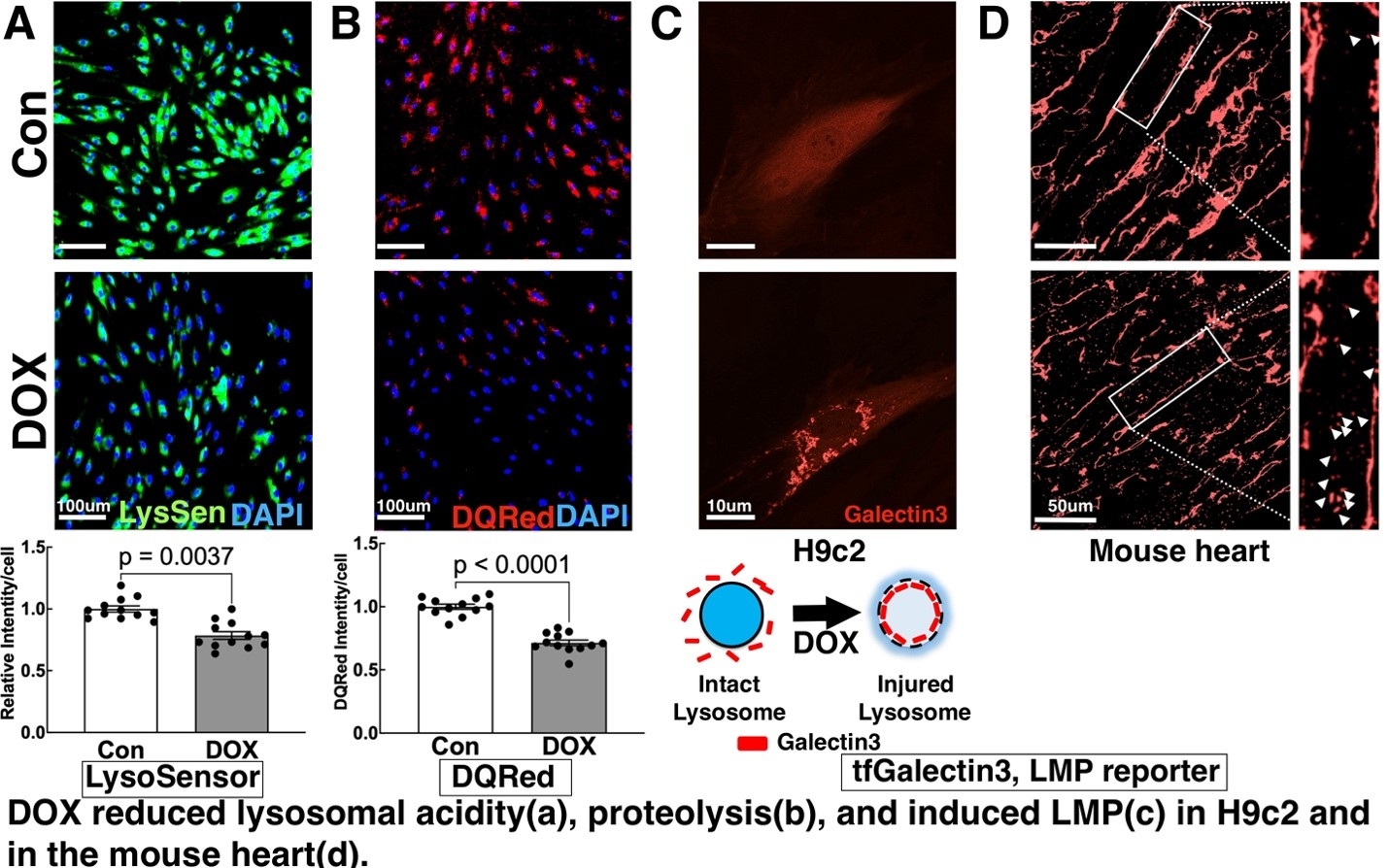Final ID: We121
Doxorubicin-Induced Cardiomyocyte Death is mediated by Lysosomal Membrane Permeabilization
Abstract Body: Doxorubicin (DOX) is a potent antineoplastic drug with broad-spectrum capabilities. However, its clinical use is hindered by dose-dependent cardiotoxicity, often leading to heart failure. This study investigates the connection between DOX-induced cardiotoxicity and lysosomal dysfunction, focusing on lysosomal membrane permeabilization (LMP) as a central mechanism in cardiomyocyte death. LMP occurs when there is a disruption in the integrity of the lysosomal membrane, releasing lysosomal enzymes into the cytoplasm. We tested the hypothesis that DOX induces LMP, contributing to cardiomyocyte death.
Utilizing a tfGalectin3 LMP reporter and Lysosensor staining, we verified LMP occurrence in DOX-treated H9C2 cardiomyoblast cells, as indicated by compromised lysosomal acidity and increased release of lysosomal protease Cathepsin D (CTSD). Western blot analysis showed elevated CTSD expression following DOX exposure, while DQRed BSA staining demonstrated diminished lysosomal proteolysis, signifying lysosomal dysfunction. Intriguingly, downregulating CTSD via siRNA aggravates cardiomyocyte death, whereas enhancing CTSD expression through adenoviral delivery exerts opposite effects, suggesting a protective role of CTSD in DOX cardiotoxicity. In vivo study using a tfGalectin3 LMP reporter mouse validated the ability of DOX to induce LMP in cardiac tissue. CTSD heterozygous knockout mice exhibited deteriorated heart function compared to the wild type, underscoring CTSD's protective role against DOX-induced cardiotoxicity. In summary, our findings highlight the critical impact of DOX on lysosomal stability and protease activity, leading to cardiomyocyte death and cardiac dysfunction. Further studies are warranted to explore potential interventions, such as imidazolines and apolipoproteins, to reinforce LMP stability and safeguard against DOX-induced cardiotoxicity.
Utilizing a tfGalectin3 LMP reporter and Lysosensor staining, we verified LMP occurrence in DOX-treated H9C2 cardiomyoblast cells, as indicated by compromised lysosomal acidity and increased release of lysosomal protease Cathepsin D (CTSD). Western blot analysis showed elevated CTSD expression following DOX exposure, while DQRed BSA staining demonstrated diminished lysosomal proteolysis, signifying lysosomal dysfunction. Intriguingly, downregulating CTSD via siRNA aggravates cardiomyocyte death, whereas enhancing CTSD expression through adenoviral delivery exerts opposite effects, suggesting a protective role of CTSD in DOX cardiotoxicity. In vivo study using a tfGalectin3 LMP reporter mouse validated the ability of DOX to induce LMP in cardiac tissue. CTSD heterozygous knockout mice exhibited deteriorated heart function compared to the wild type, underscoring CTSD's protective role against DOX-induced cardiotoxicity. In summary, our findings highlight the critical impact of DOX on lysosomal stability and protease activity, leading to cardiomyocyte death and cardiac dysfunction. Further studies are warranted to explore potential interventions, such as imidazolines and apolipoproteins, to reinforce LMP stability and safeguard against DOX-induced cardiotoxicity.
More abstracts on this topic:
High throughput screen reveals that atypical antipsychotics promote continual efferocytosis by antagonizing dopamine signaling and promoting vitamin A-dependent Arginase1 upregulation
Kojima Yoko, Ye Zhongde, Wang Fudi, Lotfi Mozhgan, Adkar Shaunak, Bell Caitlin, Luo Lingfeng, Fu Changhao, Leeper Nick
Acetylation of Mitochondrial Cyclophilin D Increases vascular Oxidative Stress, Induces Glycolitic Switch, Promotes Endothelial Dysfunction and HypertensionDikalov Sergey, Sack Michael, Dikalova Anna, Fehrenbach Daniel, Mayorov Vladimir, Panov Alexander, Ao Mingfang, Lantier Louise, Amarnath Venkataraman, Lopez Marcos, Billings Frederic

